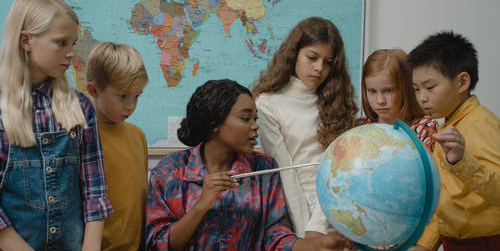by Toni Gallemí Sol
We spoke to James Arthur, founder and director of the Jubilee Centre for Character and Virtues at the University of Birmingham, a world-leading and unique institution dedicated to the study and research of how character and virtues impact on the individual and society.
The virtues of character link human growth with the potential to be and to choose to be for each individual

In this regard, Arthur states: “The classical philosophers see the virtuous character at the heart of human moral growth. A virtuous person always does the right thing for the right reasons. This was Aristotle’s philosophy. The possession of the virtues themselves includes doing good actions, for good motives, intentions and attitudes. And this is what we do at the Jubilee Centre”.
However, we already have education systems that focus on young people and their adaptation to future realities. Arthur sees a clear problem when he acknowledges that “what happens with the theory and practice of modern education in schools is that it is much more oriented towards learning competencies, skills and forms of knowledge that are deemed necessary to increase our capacity to succeed. It’s a very pragmatic approach that is concerned with a technological and material ideal of success. Not that this is essentially a bad thing, but it seems to be incomplete. At the Jubilee Centre, “we focus on the relationship between human nature and its flourishing”. For this, a goal is important, or at least a motive strong enough to withstand the onslaught of the current. “For us, the only way to understand growth in virtue is to start from what is the meaning and purpose of human life”.

The only way to understand growth in virtues is to start from what the meaning and purpose of human life are
If there is a meaning and purpose to human life as such and applicable to all, it can be far from being a relative question. It has to be something that, at the very least, unites us all in the same state of communion. So there must be one or more immovable or inextinguishable elements. This is precisely one of the great challenges to be faced because of the current “secularisation of character”, as Arthur calls it. This idea, the secularisation of character, entails a move away from the idea of the transcendent. “In contemporary schools, there is a divorce between philosophy of education and religion, and truth is perceived as relative. Many teachers and students prefer not to judge between right and wrong”. On a more concrete and personal level, one of the first consequences is that many people do not know what is true and what is not. They are thus at the mercy of any wind. Arthur insists that “we cannot assume that this kind of talk is religious or an inspiration”, and there is a real concern about virtues and character whether one is a believer or not. There has also been a lot of talk about values, that each person should have his or her own insofar as he or she considers them valuable. But there are values common to all that promote the common good, although “these require agreement and consensus. I prefer the term virtue because it is less relative and more solidly grounded. Values can vary from place to place and can easily become very different. Virtues are more grounded.
Values can vary from one place to another and can easily become very different. Virtues have a more solid foundation

If we transfer this to the field of education, the evidence is clear: we want to educate young people, but for what? For what purpose? It is not possible to have an intention without a purpose, and it is the latter that must be discerned to answer the former. “The main purpose of education is to help human beings to become more fully human. Teachers must ask themselves what kind of person they want to promote. It is not sensible to have an educational goal without considering what concrete realisations it implies”. Moreover, “the OECD, in fact, recognises that education is more than information. It is a renewed focus on educating the whole person and I agree with that”, although “the character part they want to develop is very instrumental, they say very little about moral issues”.
None of this can be achieved by encouraging the building of barriers that lead to separation or alienation between those who think differently and others. “Purpose in life is found in common projects, shared activities and intimate relationships. For this reason, the Jubilee Centre recognises that human flourishing can only occur in a decent and well-governed society characterised by social justice and the common good. Extreme inequalities destroy harmony and stability, eliminating the positive social context necessary for human development”. Arthur’s point is not superfluous, he knows where he is and where our times are heading when he points out that, at present, “Western communities are marked by division, confusion, disagreement and polarisation. (…) People seem unable to disagree with each other in a kindly way. There is a lack of harmony and consensus (…) We need to talk to each other and do it amicably”. Friendship is another concept addressed by Aristotle who emphasised that, in Arthur’s words, “societies are united in friendship. So instead of polarising and condemning each other, it is very important to seek friendship and to listen to others even if we disagree with them”. In fact, “we are not only rational and ethical beings, we are also social beings, and this is so important that growth in individuals is seen in relation to others. The social dimension is tremendously important as well.

The full development of human potential can only occur in a society characterized by social justice and the common good
From all this, we can subtract that “education is a continuous process of ‘being’ that never ends”. Character formation is dynamic and is refined as we move towards a good, although “it is slow and requires intentional practice. (…) Schools and teachers need to think about how they are going to integrate it into their teaching, into the philosophy of the school, into their exemplarity as teachers, all of these things are very important. Experiences in schools can be the catalyst for development in virtues and offer opportunities to practise good judgement (discernment) and virtue”. This need, which must be born in families and extended in schools, is indispensable. “Character is mostly learned directly from those around us. We could say that they serve as examples, as mentors. That is why it is extremely difficult to develop virtuous individuals without having a virtuous community; we learn to be virtuous in community”. For this reason, the teacher must also be a role model; it is not enough to teach and transmit a series of knowledge that anyone else could do. It is not a question of the pupils copying the teacher, but of seeing in him or her an example of conduct, not only on a professional level but, above all, on a human level through a sort of mixture of authority and closeness without exceeding the limits of each of them. Parents do not send their children “to school to think and be like the teachers”, they send them “to interact with the teachers and the other students, to relate to them and through this relationship the pupils” are imbued with “some human traits that make them better human beings than they would be if they had not met that person, that teacher”.
This vision cannot be imposed, because one of its foundations is respect for the freedom of each individual. This is another of the great challenges facing teachers: to awaken in pupils an interest and love for what is wonderful, for what is in itself good, beautiful and true. Logically, this would be impossible with blind obedience. “There is only true freedom”, James Arthur reminds us, “when one acts in the service of what is good and right”. That is, freedom is not an end in itself, but a means to achieve something good. “Freedom for what?”. That is the question.







